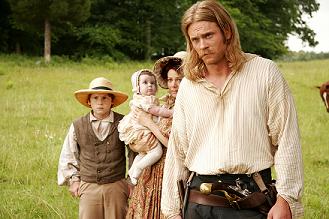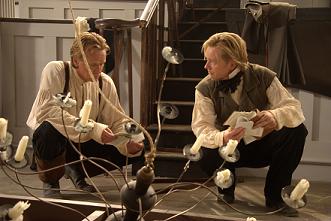

The website for The Work and the Glory III: A House Divided proclaims the movie as "The Inspiring Final Chapter" in the Work and the Glory Trilogy. However, there are actually nine volumes by Gerald N. Lund. A House Divided is based on the third novel, Truth Will Prevail. There are a combination of factors that led to this film being the stopping point. First and foremost, The Work and the Glory and The Work and the Glory: American Zion were not successful enough to ensure profitability for future films. A movie like this is tough because it has a limited audience due to its subject matter, and a limited budget for advertising. The films were also not that good. The acting and dialogue were all over the place, but managed to improve with each movie. There are few recognizable actors in the roles. And, like most religious themed films, there was a sense of preachiness to the story. All this overshadowed relatively impressive production value and a story that could use a little more work to appeal to a broader base (which is possible without losing principles).
As a concluding film, A House Divided does give a satisfying conclusion to fans of the first two movies. The history of the Mormon church will have to wait for another time, but the story of the Steed family, the main protagonists of the first two films, comes to an ending point. Not an end, but an ending point. Director Sterling Van Wagenen (The Work and the Glory II: American Zion, Alan and Naomi) uses them to give both the outsider and insider view of history. Nathan Steed (Alexander Carroll, The Work and the Glory, American Zion) is the son who joined the Mormon church. Joshua (Eric Johnson, The Work and the Glory, American Zion) went the opposite direction, as far as the point of violence. Benjamin Steed (Sam Hemmings, American Zion, The Aviator) is their father, who is a friend to the Church, and acts sometimes as a personal consultant to Joseph Smith (Jonathan Scarfe, American Zion, The Work and the Glory). Part of the reason that the acting got better is that Scarfe continues to grow as an actor, and that Van Wagenen and adapter Matt Whitaker (American Zion, Saints and Sinners) give the character more conflict. This time, he is somebody with flaws. Smith believes that God will show them the right thing to do, and believes this even as his church nears financial ruin. His followers are beginning to rebel, and his enemies are closing in. It's also no secret that the acting improved because Carroll has much less screen time.
The narrative aspects of Whitaker's screenplay are weak because they are minimal. Again, it's bad guys against Mormons, with little context as to why (something about land?). What story there is involves Smith trying to get his followers to create a bank - not too exciting. Smith is finally a more interesting person to watch because he is conflicted. The nascent Mormon church now has followers who want different things. In other words, the people seem more real. Whitaker and Van Wagenen's story works better on an emotional level. A House Divided focuses more on Joshua, the antagonist of the first two films. They portray Joshua in a more ambiguous light; he's not necessarily the bad guy, he's more complex than before. He marries Caroline Mendenhall (Meredith Salenger, Lake Placid), but is reluctant to divulge information from his past. A House Divided certainly has a different feel than the other films. It is more introspective, and although it spans two years starting from 1836, it feels less like a history lesson and more like a character study.